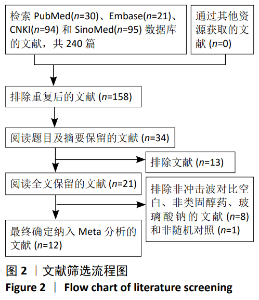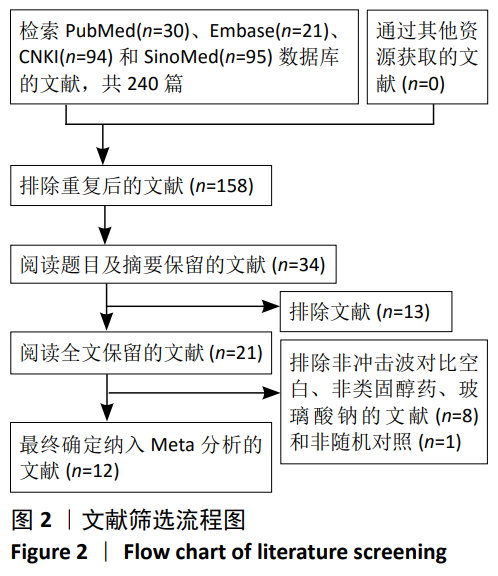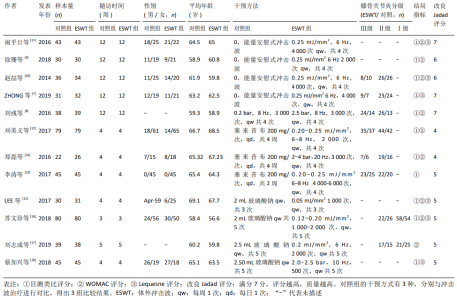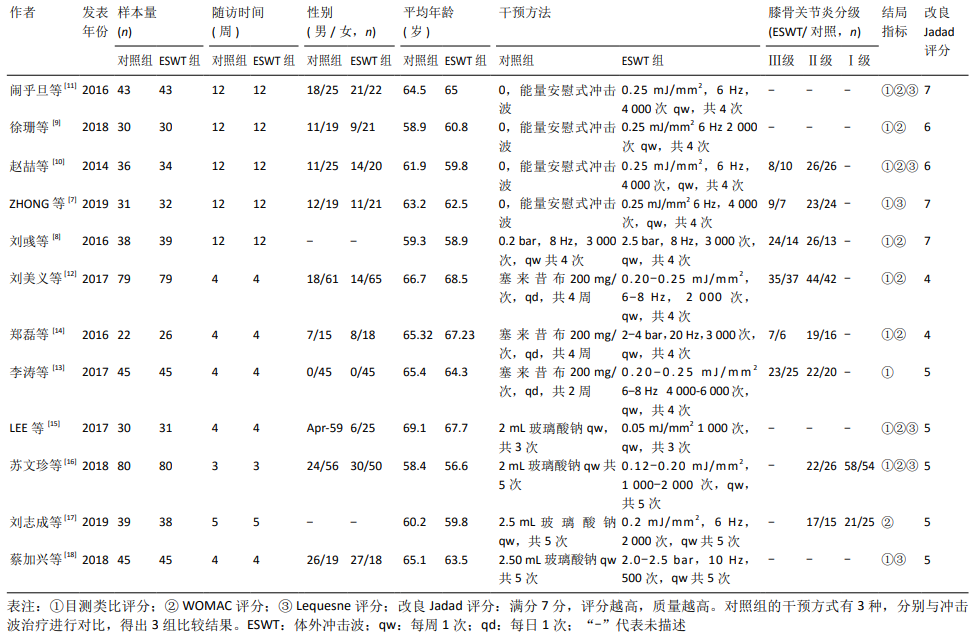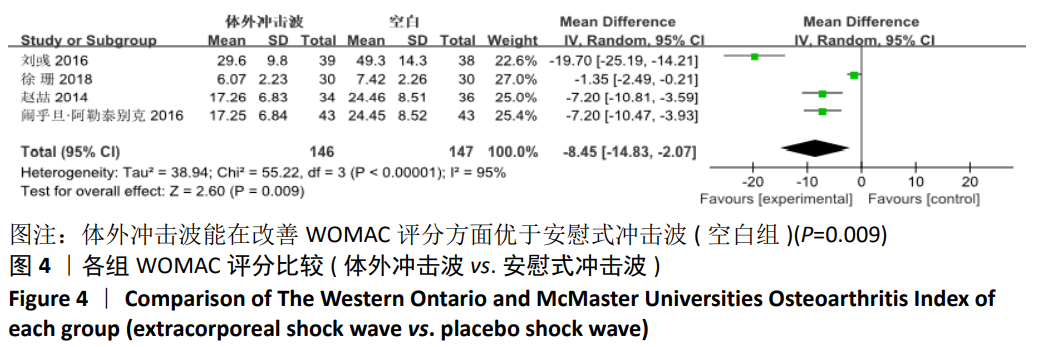Chinese Journal of Tissue Engineering Research ›› 2021, Vol. 25 ›› Issue (9): 1471-1476.doi: 10.3969/j.issn.2095-4344.3767
Comparison of the short-term efficacy of extracorporeal shock wave therapy for middle-aged and elderly knee osteoarthritis: a meta-analysis
Huang Dengcheng1, Wang Zhike1, Cao Xuewei2
- 1Second Clinical Medical College of Guangzhou University of Chinese Medicine, Guangzhou 510000, Guangdong Province, China; 2Third Department of Orthopedics, Guangdong Hospital of Chinese Medicine, Guangzhou 510000, Guangdong Province, China
-
Received:2020-04-08Revised:2020-04-16Accepted:2020-05-16Online:2021-03-28Published:2020-12-16 -
Contact:Cao Xuewei, MD, Chief physician, Third Department of Orthopedics, Guangdong Hospital of Chinese Medicine, Guangzhou 510000, Guangdong Province, China -
About author:Huang Dengcheng, Master candidate, Second Clinical Medical College of Guangzhou University of Chinese Medicine, Guangzhou 510000, Guangdong Province, China -
Supported by:the Special Project in Guangdong Hospital of Chinese Medicine, No. 2017KT1334
CLC Number:
Cite this article
Huang Dengcheng, Wang Zhike, Cao Xuewei. Comparison of the short-term efficacy of extracorporeal shock wave therapy for middle-aged and elderly knee osteoarthritis: a meta-analysis[J]. Chinese Journal of Tissue Engineering Research, 2021, 25(9): 1471-1476.
share this article
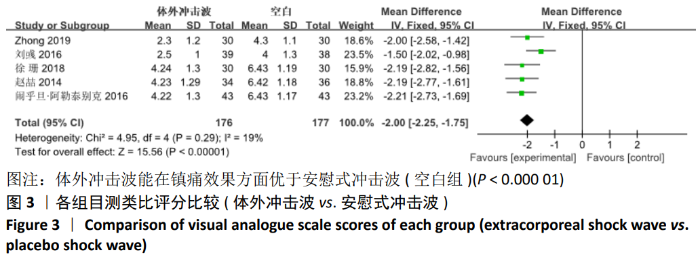
2.3 纳入文献的质量评估 该Meta分析纳入了12个随机对照研究,其中4项研究未报告分配隐藏。在5项研究中(对照组为安慰式冲击波),对受试者实施了盲法;而其余的研究因对照组有较明显的区别,因此未进行盲法设计。有2项研究因存在病例脱落,未能报道完整的结果,但在随后的数据分析中也剔除了失访病例。所有的研究均未选择性报道结果。 2.4 Meta分析结果 2.4.1 体外冲击波与空白组的疗效对比 目测类比疼痛评分 有5项研究对比了体外冲击波与安慰式冲击波干预后的疼痛评分[7-11],随访周期为12周,其中体外冲击波组176例,安慰组177例,Meta分析结果显示,研究效应量异质性低(I2=19%,P=0.29),采用固定效应模型。两组相比,差别有显著性意义(MD=-2.00,95%CI:-2.25至-1.75,P < 0.000 01),可认为体外冲击波可明显改善患者的膝关节疼痛,见图3。"
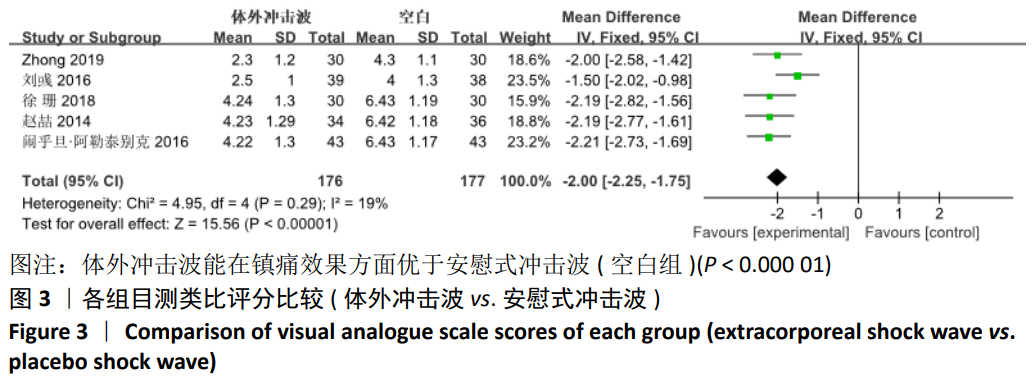

2.4.2 体外冲击波与口服非类固醇药的疗效对比 目测类比评分:共有3项研究对比了体外冲击波与口服非类固醇药干预后的疼痛评分[12-14],Meta分析结果显示,研究效应量存在明显的异质性(I2=97%,P < 0.000 01),逐一剔除纳入文献,发现剔除刘美义等[12]的研究后,异质性明显降低,但仍高于50%,故采用随机效应模型(I2=51%,P=0.15),纳入文献较少,因此未进行亚组分析。因此,纳入2项研究,其中体外冲击波组71例,口服非类固醇药治疗组67例,剔除刘美义等[12]的研究后,两组相比差异仍无显著性意义(MD=0.01,95%CI:-0.48-0.51,P=0.95),故认为该结果较为稳健,因此,相比于口服镇痛药,对患者进行体外冲击波干预时,能达到相同的镇痛效果,见图6。"


WOMAC评分:有3项研究比较了体外冲击波与关节腔注射玻璃酸钠对改善膝关节WOMAC评分的影响[15-17];Meta分析结果显示,研究效应量存在明显的异质性,通过剪补法进行敏感性分析,排除蔡加兴等[18]的文献,异质性可由76%降至44%(I2=44%,P=0.17),故采用固定效应模型,其中体外冲击波组149例,玻璃酸钠治疗组149例。两组相比WOMAC评分差异有显著性意义(MD=-2.17,95%CI:-3.61至-0.74,P=0.003),因此,改善以膝关节WOMAC评分评价膝关节功能方面,相比于目前应用较广的关节腔注射玻璃酸钠治疗,体外冲击波可更好地改善膝骨关节炎患者膝关节症状与功能,见图9。"


Lequesne评分:有3项研究比较了体外冲击波与关节腔注射玻璃酸钠对改善膝关节Lequesne评分的疗效[15-16,18];Meta分析结果显示,研究效应量存在明显的异质性,通过剪补法进行敏感性分析,排除刘志成等[17]的文献,异质性可由80%降至57%(I2=57%,P=0.10),异质性仍大于50%,纳入文献较少,因此未进行亚组分析,故采用随机效应模型,其中体外冲击波组156例,玻璃酸钠治疗组155例。两组Lequesne评分差异无显著性意义(MD=-0.21,95%CI:-1.09-0.67,P=0.64),因此,在改善以膝关节Lequesne评分评价膝关节功能方面,体外冲击波与关节腔注射玻璃酸钠效果无明显差别,见图10。 2.5 发表偏倚分析 根据Cochrane手册的建议,漏斗图进行发表偏倚评价需该指标Meta分析纳入的研究数不应少于10篇文献。否则会因为该指标纳入的研究数过少,从而降低漏斗图的检验能力,否则无法判断不对称的真实性。而此文献虽然纳入12项研究,但对照组的干预方式不统一,因此未将不同干预方式的效应量进行合并,因此未进行发表偏倚漏斗图分析。"

| [1] BIJLSMA JW, BERENBAUM F, LAFEBER FP. Osteoarthritis: an update with relevance for clinical practice. Lancet. 2011;377(9783):2115-26. [2] ABRAMSON SB, ATTUR M. Developments in the scientific understanding of osteoarthritis. Arthritis Res Ther. 2009;11(3):227. [3] CONAGHAN PG, FELSON D, GOLD G, et al. MRI and non-cartilaginous structures in knee osteoarthritis. Osteoarthritis Cartilage. 2006;14 Suppl A:A87-94. [4] AYRAL X, PICKERING EH, WOODWORTH TG, et al. Synovitis: a potential predictive factor of structural progression of medial tibiofemoral knee osteoarthritis-results of a 1 year longitudinal arthroscopic study in 422 patients. Osteoarthritis Cartilage. 2005;13(5):361-367. [5] 农家隆.膝关节骨性关节炎治疗进展[J].现代医学与健康研究电子杂志,2019,3(9):23-25. [6] MILLS K, HÜBSCHER M, O’LEARY H, et al. Current concepts in joint pain in knee osteoarthritis. Der Schmerz. 2019;33(1):22-29. [7] ZHONG Z, LIU B, LIU G, et al. A Randomized Controlled Trial on the Effects of Low-Dose Extracorporeal Shockwave Therapy in Patients With Knee Osteoarthritis. Arch Phys Med Rehabil. 2019;100(9):1695-1702. [8] 刘彧.体外冲击波疗法对绝经后女性早中期膝骨关节炎的疗效观察[D].石家庄:河北医科大学,2016. [9] 徐珊,甘国胜,阮剑辉.体外冲击波治疗早中期膝骨关节炎的效果[J].医学信息, 2018,31(z2):78-79. [10] 赵喆,史展,闫君,等.体外冲击波治疗早中期膝骨关节炎的效果[J].中国康复理论与实践, 2014,20(1):76-78. [11] 闹乎旦.阿勒泰别克,张玉玲,孙开军,等.体外冲击波治疗早中期骨性膝关节炎的临床疗效对比[J].农垦医学,2016,38(5):434-436. [12] 刘美义,黎环,张亚清,等.体外冲击波治疗老年膝骨性关节炎的疗效及对患者炎性因子的影响[J].海南医学,2017,28(24):4015-4017. [13] 李涛,宋奇志,裴建祥,等.体外冲击波治疗早中期膝关节骨关节炎的近期临床疗效观察[J].重庆医学,2017,46(3):338-340. [14] 郑磊. 体外冲击波治疗膝骨性关节炎的近期疗效分析[D].芜湖:皖南医学院,2016. [15] LEE JK, LEE BY, SHIN WY, et al. Effect of Extracorporeal Shockwave Therapy Versus Intra-articular Injections of Hyaluronic Acid for the Treatment of Knee Osteoarthritis. Ann Rehabil Med. 2017;41(5):828-835. [16] 苏文珍,林永杰,王国伟,等.体外冲击波联合玻璃酸钠注射治疗膝关节骨关节炎的疗效观察[J].中华解剖与临床杂志,2018,23(5):418-421. [17] 刘志成,宋健,张其亮,等.体外冲击波与膝关节腔内注射透明质酸钠治疗膝骨关节炎的比较[J].中国组织工程研究,2019,23(15):2297-2302. [18] 蔡加兴.应用体外冲击波治疗膝骨关节炎的临床观察[D].福州:福建医科大学,2018. [19] Qin LF, Wang WC, Fang H, et al. Expression of NF-κB and osteopontin of synovial fluid of patients with knee osteoarthritis. Asian Pac J Trop Med. 2013;6(5):379-382. [20] Moretti B, Iannone F, Notarnicola A, et al. Extracorporeal shock waves down-regulate the expression of interleukin-10 and tumor necrosis factor-alpha in osteoarthritic chondrocytes. BMC Musculoskelet Disord. 2008;9:16. [21] Mariotto S, Cavalieri E, Amelio E, et al. Extracorporeal shock waves: from lithotripsy to anti-inflammatory action by NO production. Nitric Oxide. 2005;12(2):89-96. [22] Ciampa AR, de Prati AC, Amelio E, et al. Nitric oxide mediates anti-inflammatory action of extracorporeal shock waves. FEBS Lett. 2005; 579(30):6839-6845. [23] 骨肌疾病体外冲击波疗法中国专家共识(第2版). 中国医学前沿杂志(电子版),2017,9(2):25-33. [24] Wang CJ. Extracorporeal shockwave therapy in musculoskeletal disorders. J Orthop Surg Res. 2012;7:11. [25] 李明真,周谋望.体外冲击波治疗膝骨关节炎机制的研究进展[J].中国康复医学杂志, 2019, 34(8):999-1003. [26] Alshihri A, Peer WK, Heimes D, et al. Extracorporeal Shock Wave Stimulates Angiogenesis and Collagen Production in Facial Soft Tissue. J Surg Res. 2019;245:483-491. [27] Ji Q, Wang P, He C. Extracorporeal shockwave therapy as a novel and potential treatment for degenerative cartilage and bone disease: Osteoarthritis. A qualitative analysis of the literature. Prog Biophys Mol Biol. 2016;121(3):255-265. [28] 张仕年,王萧峰,章东.骨关节炎体外冲击波治疗的能量分布研究[J].生物医学工程学杂志, 2015,32(2):300-304. [29] 赵喆,王振宇,姜川,等.体外冲击波对兔膝骨性关节炎软骨细胞凋亡的影响[J].实用医学杂志,2012,28(20):3348-3350. [30] 赵喆,安佰京,李志国,等.体外冲击波延缓兔膝骨性关节炎退变的实验研究[J].中国矫形外科杂志,2012,20(21):1972-1975. |
| [1] | Xu Feng, Kang Hui, Wei Tanjun, Xi Jintao. Biomechanical analysis of different fixation methods of pedicle screws for thoracolumbar fracture [J]. Chinese Journal of Tissue Engineering Research, 2021, 25(9): 1313-1317. |
| [2] | Jiang Yong, Luo Yi, Ding Yongli, Zhou Yong, Min Li, Tang Fan, Zhang Wenli, Duan Hong, Tu Chongqi. Von Mises stress on the influence of pelvic stability by precise sacral resection and clinical validation [J]. Chinese Journal of Tissue Engineering Research, 2021, 25(9): 1318-1323. |
| [3] | Zhang Tongtong, Wang Zhonghua, Wen Jie, Song Yuxin, Liu Lin. Application of three-dimensional printing model in surgical resection and reconstruction of cervical tumor [J]. Chinese Journal of Tissue Engineering Research, 2021, 25(9): 1335-1339. |
| [4] | Zhang Yu, Tian Shaoqi, Zeng Guobo, Hu Chuan. Risk factors for myocardial infarction following primary total joint arthroplasty [J]. Chinese Journal of Tissue Engineering Research, 2021, 25(9): 1340-1345. |
| [5] | Li Dadi, Zhu Liang, Zheng Li, Zhao Fengchao. Correlation of total knee arthroplasty efficacy with satisfaction and personality characteristics [J]. Chinese Journal of Tissue Engineering Research, 2021, 25(9): 1346-1350. |
| [6] | Wei Wei, Li Jian, Huang Linhai, Lan Mindong, Lu Xianwei, Huang Shaodong. Factors affecting fall fear in the first movement of elderly patients after total knee or hip arthroplasty [J]. Chinese Journal of Tissue Engineering Research, 2021, 25(9): 1351-1355. |
| [7] | Wang Jinjun, Deng Zengfa, Liu Kang, He Zhiyong, Yu Xinping, Liang Jianji, Li Chen, Guo Zhouyang. Hemostatic effect and safety of intravenous drip of tranexamic acid combined with topical application of cocktail containing tranexamic acid in total knee arthroplasty [J]. Chinese Journal of Tissue Engineering Research, 2021, 25(9): 1356-1361. |
| [8] | Xiao Guoqing, Liu Xuanze, Yan Yuhao, Zhong Xihong. Influencing factors of knee flexion limitation after total knee arthroplasty with posterior stabilized prostheses [J]. Chinese Journal of Tissue Engineering Research, 2021, 25(9): 1362-1367. |
| [9] | Peng Zhihao, Feng Zongquan, Zou Yonggen, Niu Guoqing, Wu Feng. Relationship of lower limb force line and the progression of lateral compartment arthritis after unicompartmental knee arthroplasty with mobile bearing [J]. Chinese Journal of Tissue Engineering Research, 2021, 25(9): 1368-1374. |
| [10] | Huang Zexiao, Yang Mei, Lin Shiwei, He Heyu. Correlation between the level of serum n-3 polyunsaturated fatty acids and quadriceps weakness in the early stage after total knee arthroplasty [J]. Chinese Journal of Tissue Engineering Research, 2021, 25(9): 1375-1380. |
| [11] | Zhang Chong, Liu Zhiang, Yao Shuaihui, Gao Junsheng, Jiang Yan, Zhang Lu. Safety and effectiveness of topical application of tranexamic acid to reduce drainage of elderly femoral neck fractures after total hip arthroplasty [J]. Chinese Journal of Tissue Engineering Research, 2021, 25(9): 1381-1386. |
| [12] | Wang Haiying, Lü Bing, Li Hui, Wang Shunyi. Posterior lumbar interbody fusion for degenerative lumbar spondylolisthesis: prediction of functional prognosis of patients based on spinopelvic parameters [J]. Chinese Journal of Tissue Engineering Research, 2021, 25(9): 1393-1397. |
| [13] | Lü Zhen, Bai Jinzhu. A prospective study on the application of staged lumbar motion chain rehabilitation based on McKenzie’s technique after lumbar percutaneous transforaminal endoscopic discectomy [J]. Chinese Journal of Tissue Engineering Research, 2021, 25(9): 1398-1403. |
| [14] | Chen Xinmin, Li Wenbiao, Xiong Kaikai, Xiong Xiaoyan, Zheng Liqin, Li Musheng, Zheng Yongze, Lin Ziling. Type A3.3 femoral intertrochanteric fracture with augmented proximal femoral nail anti-rotation in the elderly: finite element analysis of the optimal amount of bone cement [J]. Chinese Journal of Tissue Engineering Research, 2021, 25(9): 1404-1409. |
| [15] | Du Xiupeng, Yang Zhaohui. Effect of degree of initial deformity of impacted femoral neck fractures under 65 years of age on femoral neck shortening [J]. Chinese Journal of Tissue Engineering Research, 2021, 25(9): 1410-1416. |
| Viewed | ||||||
|
Full text |
|
|||||
|
Abstract |
|
|||||
